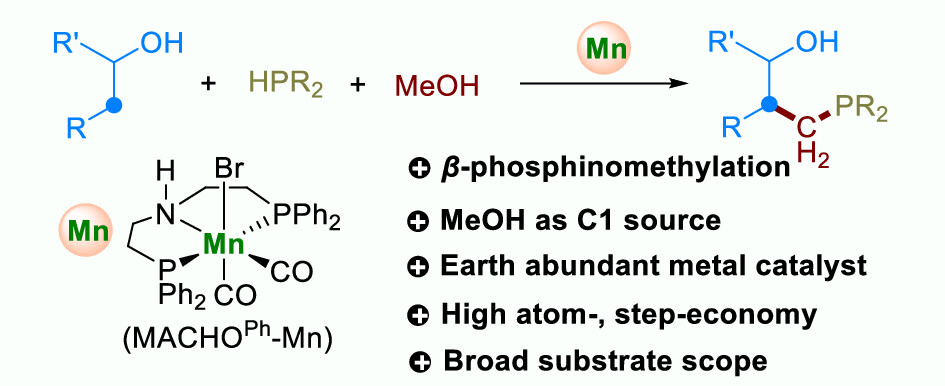Recently, the research group led by Professor Liu Weiping, a specially appointed researcher in the College of Chemistry and Chemical Engineering/Key Laboratory of Science & Technology of Eco-Textiles, Ministry of Education, has made new progress in the field of manganese-catalyzed multi-component hydrogen-borrowing reactions.
The research group led by Professor Liu Weiping has been dedicated to the study of selective coupling reactions of alcohols via high-yield manganese-catalyzed alcohol dehydrogenation. The authors propose to “block” the first step of the hydrogenation reaction by adding nucleophilic phosphine reagents. Specifically, the α,β-unsaturated carbonyl intermediate formed initially undergoes Michael addition with the phosphine reagent, followed by the “return” of borrowed hydrogen to form γ-hydroxyphosphine compounds. Building upon previous work, the research group has recently achieved real progress in this respect through a manganese-catalyzed hydrogen-borrowing strategy, specifically, the β-phosphination reaction of alcohols using methanol as the C1 source. This reaction requires no additional oxidants or reducing agents and only produces water and hydrogen gas as by-products, meeting the principles of green chemistry. It offers a new and efficient pathway for the construction of structurally diverse organic phosphine compounds.

The research achievement, “Borrowing Hydrogen β Phosphinomethylation of Alcohols Using Methanol as C1 Source by Pincer Manganese Complex”, was published in the prestigious international journal, Journal of the American Chemical Society. Sun Feixiang, a Ph.D. student from the Class of 2021 and Chen Xin, a Ph.D. student from the Class of 2022 in the College of Chemistry and Chemical Engineering, are the co-first authors of the paper. Graduate students Wang Siyi, Sun Fan, and Professor Zhao Shengyin are co-authors of the paper, and Professor Liu Weiping, a special-term researcher, is the corresponding author. And Donghua University is the sole corresponding institution for the publication.

Link to the paper: https://pubs.acs.org/doi/10.1021/jacs.3c10484


